passover
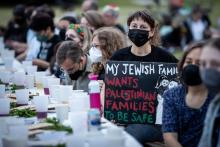
What does it mean to celebrate Passover during a time of rising authoritarianism, climate crisis, and genocide? Every year, Jews mark Passover by reading the Haggadah and by refraining from eating leavened bread for eight days in commemoration of the ancient Israelites’ hurried trip out of Egypt. The Exodus story tells of their journey from slavery to freedom, and each year Jews are commanded to experience this ritual anew, imagining that God is setting them free as if in the days of old.
But as the yearly calendar brings us to a holiday celebrating divine redemption and freedom, it’s hard to avoid the despair of this historical moment.

Peter Beinart, author of Being Jewish After the Destruction of Gaza, rejects the idea that the liberation of Palestine is an antimsemitic project. In fact, he argues that Zionism has become an idol for some Jewish leaders, and advocating for Palestinian people

Christians have long been curious about the Jewish custom of Passover. Passover, a major Jewish holiday that remembers the Israelites’ escape from slavery in Egypt, is an integral part of the events of Christian Holy Week, with the gospels recounting how the meal known as the Last Supper happened around the beginning of Passover that year, right before Jesus was crucified.
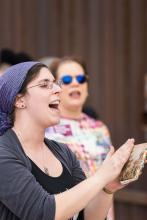
It was Wednesday, March 27th. I was one of 20 rabbis and cantors, assembled by T’ruah: The Rabbinic Call for Human Rights and the Hebrew Immigrant Aid Society (HIAS), to witness and report on the border. A few hours earlier, CBP Commissioner Kevin McAleenan (now ICE’s acting director) had held a press conference at the same spot.

Passover is approaching. The first night and its ceremonial meal, the Seder, will come the night of April 19. The night before, Holy Thursday, for Christians commemorates the Last Supper, a Passover Seder. And April 19 is the anniversary of the beginning of the American Revolution against a tyrannical king. It’s a powerful confluence!
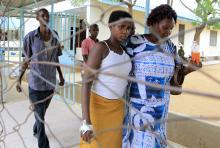
Last week, al-Shabab militants, aligned with al-Qaida, stormed the campus of Garissa University College in Kenya, asking students about their religion. They spared the lives of Muslims and killed the Christians. By the time the mayhem was over, almost 150 students lay dead.
A spokesmen for the terrorists boasted: “There are many dead bodies of Christians inside the building. We are also holding many Christians alive.”
This is not the first time that this has happened in Kenya. In 2013, at the Westgate shopping mall in Nairobi, 67 people were killed in cold blood. Muslims were allowed to go free.
The dead were all Christians.
In Libya in February, Islamic State militants beheaded 21 men on the beach. Their blood freely flowed into the Mediterranean Sea.
The victims were all Coptic Christians.
The Middle East contains proud remnants of the oldest Christian communities in the world. Their churches have been in flames. ISIS has demanded that the Christians convert to Islam, pay extra taxes or be killed. In Syria in February, ISIS militants abducted scores of Assyrian Christians.
Just because they are Christian.

This is Holy Week, the most sacred time of year for Christians. It is the time they mark the betrayal, trial, and crucifixion of Jesus, and a week that culminates in Easter Sunday, the day Christians believe Jesus rose from the dead. So what do colored eggs have to do with anything? Let us Egg-‘Splain …
Q: Is Holy Week really a whole week? I only know about Good Friday and Easter Sunday.
A: Holy Week is the entire week between Palm Sunday and Easter Sunday. Not a whole lot happens on Monday and Tuesday, but some Christians mark the crucifixion on Wednesday, and some celebrate Maundy Thursday, the day of the Last Supper, Jesus’ final Passover meal with his disciples. It is sometimes celebrated with a foot-washing ceremony, a tradition beloved by Pope Francis, and a “Pascha” or “Paschal” meal, derived from the Jewish Passover Jesus would have known. Then comes Good Friday, Holy Saturday, and Easter Sunday. Fun fact: Not all American Christians greet each other with “Happy Easter.” To many evangelicals, the day is “Resurrection Sunday,” in part because they believe the word “Easter” has pagan roots.
Q: What is so “good” about Good Friday, the day Jesus was horribly tortured to death?
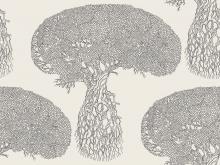
Fifty years ago, the sleeping giant of America’s religious communities shook off their sleep and rose to change the country in a crisis over whether democracy would grow or falter.
Today we face a crisis over the very fabric of life – human and more-than-human – on our planet. Is there anything the religious communities, now yawning their way just beginning to awake, can bring to dealing with that crisis?
There is. Much of it comes from the Hebrew Scriptures, what Christians call “the Old Testament.” It reaches a climax in the Exodus story, recalled each year in the Jewish festival of Passover and to some extent in the Holy Week that in Christian tradition is rooted in Passover. But it pervades the Hebrew Bible.
For that is the record of the spiritual struggles of an indigenous people of shepherds and farmers in their relationship with YyyyHhhhWwwwHhhh, the Holy One Who breathes all life. They centered their God connection in sacred relationship with their land, especially through the foods they grew and then offered on the altar.
Our own generation, facing a catastrophic crisis in the Earth-earthling relationship, must go back to the Bible for guidance on how to apply indigenous wisdom to the planet as a whole.

Anti-Semitic incidents in the U.S. spiked 21 percent last year, according to the Anti-Defamation League, unsettling many American Jews who had thought that hatred of Jews and Judaism was on the decline, at least here at home.
The ADL has released a spring report for the past 10 years that showed fewer incidents targeting American Jews. That downward trend contrasted sharply to the rising tide of anti-Semitism in Europe — recently witnessed in the January killings of four Jews at a kosher supermarket in Paris.
“The United States still continues to be unique in history” as a safe place for Jews, said Abraham Foxman, the ADL’s national director.
But this new ADL report casts a shadow on the idea that the U.S., which is home to more than 40 percent of the world’s Jews, stands in stark contrast to European anti-Semitism and far higher levels of antipathy against Jews in the Middle East, as reflected in studies of anti-Semitic attitudes worldwide.
“It’s still different here than anywhere else, but don’t take anything for granted, and be concerned,” Foxman said.
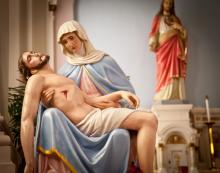
This year, Good Friday and the start of Passover occur on the same date: Friday, April 3. The coincidence is no accident.
Jesus’ pilgrimage to Jerusalem to celebrate the eight-day Jewish festival marking the Hebrew slaves’ exodus from Egyptian slavery was a religious requirement for Jews of his day. After his death by Roman crucifixion, Passover became an integral part of the Easter story, and Jesus’ Last Supper was like an early version of what later became the Passover seder meal.
In past years, I anonymously attended Good Friday services in New York and sat alongside Christians as they commemorated the death of Jesus as recounted in the New Testament Gospel of John. I alternated each year between Roman Catholic and Protestant churches because I was interested in how preachers handled John’s 71 references to the Jewish people, a text that’s often called “radioactive” because of its negative teaching about Jews and their alleged culpability in killing Jesus.
I attend the most solemn Christian service of the year knowing it had often been a day of dread and even death for many European Jewish communities.
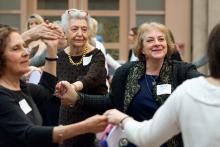
On the first night of Passover, Jews ask aloud, “Why is this night different from all other nights?”
For a group of 150-plus women gathered March 22 at Congregation Beth El north of Washington, D.C., that traditional question was followed by an alternative: “Why is this seder different from other seders?”
Answer: “At other seders, men traditionally lead the service. At this seder, women are the leaders.”
Women’s seders are not new. The women who gathered at Beth El on Sunday, 12 days before the holiday begins on April 3, have been at it for 19 years. These seders began in or near cities with substantial Jewish populations about a generation ago, when fewer women played leading roles in synagogues and other institutions of Jewish life.
Today, women in the Conservative, Reform, and Reconstructionist movements of Judaism in the U.S., which account for about 90 percent of synagogue-affiliated Jews, lead congregations as rabbis, cantors, and synagogue presidents.
Still, women’s seders proliferate, and each year, their guest lists grow.

Rabbi Ruth Bader Ginsburg?
Not quite, but when a Jewish nonprofit asked the Supreme Court justice to write a biblical commentary for Passover, she agreed, and added a feminist twist: It would raise up the often overlooked women of the Exodus story.
Ginsburg, one of three Jews and three women on the high court, is known as a champion of women’s rights — but not for being particularly religious.
But Rabbi Lauren Holtzblatt, whom Ginsburg asked to help out with the commentary, said Ginsburg had a clear vision for the piece and knew exactly which biblical women she wanted to highlight from the iconic liberation story of the Book of Exodus.
“She has a Jewish soul, there is no question,” Holtzblatt, a rabbi at Adas Israel, a Conservative synagogue in Washington, D.C., said of Ginsburg.
“It’s in her. It’s deeply in her.”
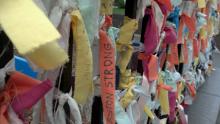
My first marathon ever — 2003 in New York City — did not go according to plan. On the positive side, I would never have guessed that P. Diddy would be running the same marathon and at the same pace for much of it, providing an entertaining entourage to distract me from my exhaustion. On the negative side, my name, which I had taped to my tank top so the crowds could give me much-needed encouragement, quickly peeled off, and I was anonymous in the crowd. My plan had been to run that last mile to the mantra “you can do anything” or “you are power,” but instead, my legs barely moving and my husband and close friend no longer by my side, I chanted dejectedly to myself: “Never again, never again.”
I didn’t know what misery associated with a marathon really was, though, until I heard about the Boston Marathon bombings, which took place one year ago today. On this day, two young brothers set off two bombs at the end of the Boston Marathon. As we waited to understand the damage, I remember thinking about the juxtaposition of the runners’ feelings of accomplishment setting in just as shrapnel began to fly. Then I received the painful — even if relieving — news that my first cousin had been right at the finish line with her husband and baby (born a year ago exactly on that marathon Monday) and had escaped the violence only because the baby needed her nap. We eventually learned that three people were dead, hundreds were injured, and the two suspected perpetrators were associated with radical Islam. I felt disgust and horror.
Moments such as this challenge each of us to live up to the “better angels of our nature,” as President Abraham Lincoln put it. As has been borne out by various terrorist attacks around the globe, terrorism breeds fear — its intended consequence. Too often this fear becomes fear of a religious group. We, as Jews, know intimately the perils of a society surrendering to this type of fear.
In his weeky address, President Obama said in part:
"For millions of Americans, this weekend is a time to celebrate redemption at God’s hand. Tonight, Jews will gather for a second Seder, where they will retell the story of the Exodus. And tomorrow, my family will join Christians around the world as we thank God for the all-important gift of grace through the resurrection of His son, and experience the wonder of Easter morning.
"These holidays have their roots in miracles that took place thousands of years ago. They connect us to our past and give us strength as we face the future. And they remind us of the common thread of humanity that connects us all.
"For me, and for countless other Christians, Easter weekend is a time to reflect and rejoice...."

We had our fourth annual Passover Seder at Milagro last night. I know, you’re thinking, “what are a bunch of goyim doing celebrating a Jewish tradition?” Given that the central act of our worship service every week – communion – was first introduced by Jesus at his last Seder, we figure if it’s good enough for Jesus, it works for us too.
For the most part, it was a party. But there’s a point at which the leader reads off the ten plagues described in Exodus, none of which is pleasant. For each plague, you dip your finger in a cup of wine and mark the edge of your plate with a crimson dot as a reminder throughout the meal of the suffering experienced by those in captivity.
It’s not exactly a crowd-pleaser, but it’s a valuable symbol, placing in context the joy, food and fellowship that dominate the rest of the evening. Go ahead and enjoy, toast and eat well, but don’t forget.
It got me thinking about what the plagues of our day would be if I were to list them. No, I don’t ascribe to the belief that God sends such horrific episodes upon us as punishment, but I do believe that our free will affords us enough rope to hang ourselves at times, so to speak. Our current plagues are more existential, but the byproducts are often painfully tangible.
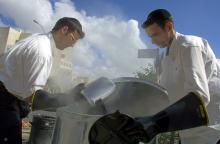
During the month leading up to Passover, which this year begins April 6 at sundown, Chevy Weiss, an ultra-Orthodox Jewish mother with five kids and a demanding career, scrubs and vacuums almost everything in her Baltimore home.
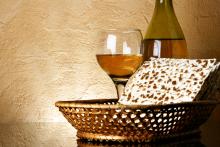
“Easter? Isn’t that over?” I’m already gearing up to hear this, just as I launch into trying to trying to actually make something spiritually of Lent’s remaining weeks, after my feeble efforts, while also anticipating the Feast of Feasts that awaits in a little more than two weeks.
At work, hunched over my vegetarian lunch of channa dal and naan (Orthodox Lent is all about carbs!), I furtively scan florist websites for vibrant bouquets, and think about ordering that grass-fed leg of lamb from the small farmer who sells meat at our local market. I wonder if I get the cute bouquet of bright pink roses with the foam Easter eggs and the fuzzy bunny for my daughter, will the flowers hang on for another seven days to grace our Pascha table?

Jews have been known to have a last hurrah before Passover, gorging on pizza, pasta, bagels, cakes and other leavened goodies that become verboten during the eight-day holiday, which starts this year on April 6.
But the last thing Amy Siegel probably wants to eat right about now is another cupcake.
Siegel, a wife, mother of four and strictly observant Jew from Clifton, N.J., is a bit of a big deal in cooking contest circles, with about $50,000 in winnings to her name, including the grand prize in the Man-O-Manischewitz Cook-off three years ago.
Now, after years of trying, she's finally made it to the majors, snagging one of a hundred spots in the biennial Pillsbury Bake-Off in Orlando on Monday (March 26) with her strawberry swirl-peanut-butter-brownie cupcakes. The grand prize is $1 million.
Only one problem: The bake-off takes place 11 days before Passover, and all the weeks Siegel typically devotes to preparing her kitchen for the holiday -- swapping out her normal cookware, dishes and cutlery for Passover versions and emptying her cupboards and fridge of all food not fit for Passover -- she's spent rehearsing her decidedly non-Passover-friendly recipe.
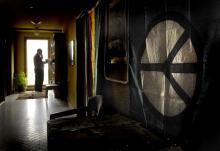
Editor's Note: At the beginning of February, the United Nation celebrates World Interfaith Harmony Week. To mark the occasion the Tony Blair Faith Foundation asked people to share their stories of finding friendship and connection with someone of a different faith tradition. This is my story.
When it came time to read from the Torah — handwritten scrolls containing the first five books of the Hebrew Scriptures that are kept in a special ark in every synagogue — something happened I’d never seen or experienced before. The Torah scrolls, which are kept in a blue velvet cover with gold embroidery, were taken down and passed to the congregation. I’d seen men in synagogue hold the scrolls, but I’d never seen them passed this way, from person to person, like the collection basket or the little trays of wine or bread in some of the churches I’d attended over the years.
I’m not Jewish, and in that little gathering of a dozen or so people, I think everyone there knew it. Still, when the scrolls got to me, the woman next to me, without a moment’s hesitation, placed them gently in my arms, like a newborn baby.
I’ve yet to conjure up the words to describe how that moment of inclusion felt. Sacred, yes. Grace-filled, absolutely. But also ancient — tying me to a whole history of a people whom I’d never before thought of as “mine.”
But they are. The Sechers are. The other people at the Bozeman synagogue were. The strangers at the supermarket where we bought matzo and wine were. The people who are reading these words are.
Monks. Al Franken. Oysters. Here's a little roundup of links from around the Web you may have missed this week:
- The Benedictine monks at Portsmouth Abbey take to the Internet in search of new recruits.
- What do you think about the Greg Mortenson controversy?
- iPhones can track your every move and Senator Al Franken is NOT happy about it.
- What would Congress look like if it really represented America?
- Should Christians celebrate Passover? And does an oyster belong on the Seder plate?